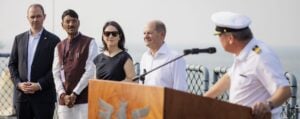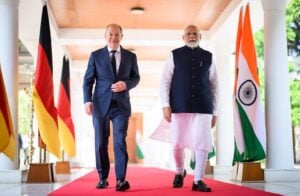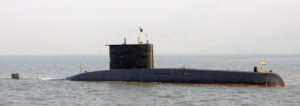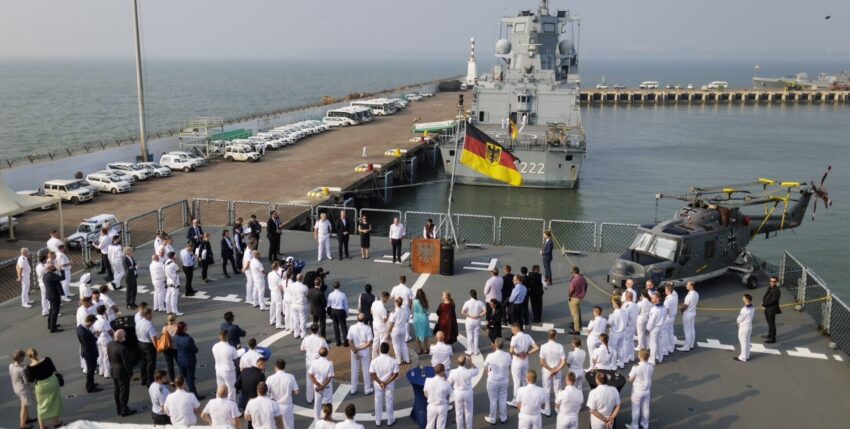Will they be the breakthrough for submarine deliveries to India?
On 21 October, the Press and Information Office of the Federal Government (BPA) announced that Federal Chancellor Olaf Scholz would be travelling to New Delhi for the 7th Indo-German Government Consultations. The theme of the event was "Growing Together with Innovation, Mobility and Sustainability". In addition to an official exchange with Indian Prime Minister Narendra Modi, the programme included a joint plenary session of all participants in the government consultations chaired by the two heads of government on 25 October and a joint appearance at the 18th Asia-Pacific Conference of German Business, which took place in New Delhi from 24 to 26 October.

The Federal Chancellor then travelled to Vasco da Gama in the state of Goa on 26 October to visit the "Baden-Württemberg" and "Frankfurt am Main" naval units based there. The frigate and the task force provider are on site as part of the "Indo-Pacific Deployment - Pacific Waves" and are completing an exercise programme with the Indian Navy, among others (see previous report).
The Asia-Pacific Conference is jointly organised by the Asia-Pacific Committee of German Business (APA), the Federal Ministry for Economic Affairs and Climate Protection (BMWK) and the German Chambers of Commerce Abroad in Asia-Pacific. The conference is co-chaired by APA Chairman Roland Busch and the Federal Minister for Economic Affairs and Climate Protection, Robert Habeck.

Robert Habeck and Foreign Minister Annalena Baerbock also took part in the 7th Indo-German intergovernmental consultations. Boris Pistorius was represented by a state secretary due to illness.
Intensification of defence cooperation?
Germany's defence relations with India, which have been rather meagre to date, are not without problems. In the past, India's behaviour towards its neighbours China and Pakistan had the effect of slowing down cooperation. Since the Russian war in Ukraine, Germany's position in all policy areas with regard to India has undergone a reorientation. In terms of global climate policy, India is being increasingly courted. During a visit to India in February 2023, Federal Chancellor Olaf Scholz held out the prospect of greater defence cooperation without going into details - at least externally. The "quality of German technology" is also highly recognised by Indian partners in this area, Scholz said at the time, as reported by Handelsblatt.
Against this backdrop, bilateral relations are now expected to be reaffirmed in terms of defence policy. This is despite New Delhi's ambivalent attitude towards Moscow and Western countries. In addition to increased cooperation at the armed forces level (e.g. exercises, personnel exchanges, training measures), defence projects could also be discussed. During his visit to India in the summer of 2023, Defence Minister Boris Pistorius signed a letter of intent for a submarine project. The German submarine builder tkMS and the Indian company Mazagon Dock Shipbuilders, Mumbai, signed an agreement in June 2023. Memorandum of Understanding on the potential development and possible construction of up to six submarines with air-independent propulsion.
The project has not yet been finalised as a government decision is still pending. The Kiel shipyard has launched the P75I project (Project 75 India) for India. In August 2024, Global Flow Control reported that the Indian Navy had spoken out in favour of building six submarines in cooperation with Germany.

To date, the Indian Navy has deployed four Type 209 submarines, which were built by HDW in the 1980s as part of a German-Indian co-operation. They operate there under the class designation Shishumar. Build numbers one and two were built by HDW in Kiel, while boats three and four were built by Mazagon Dock Shipbuilders Limited in Mumbai. From 2016, modernisation projects on two of the four boats were contractually agreed and implemented.
Can Berlin defy the foreign competition?
Madrid and Seoul are vying for the deal, which is estimated to be worth more than five billion euros, as is Paris. The French government can look back on a very successful defence cooperation. The contracts for Scorpène submarines signed in 2005 and the procurement of Rafale aircraft concluded in 2016 have made India the leading buyer of French defence products in Asia and the second largest in the world in the period 2012-2021. In October 2023, ongoing negotiations between India and France continued for the acquisition of 26 new Rafale carrier-capable aircraft for the Navy and three new Scorpène submarines.
The Indian Navy currently operates seventeen diesel-powered submarines and two nuclear-powered submarines armed with ballistic missiles. While the two strategic submarines are home-built, the rest of the submarine fleet consists of a mix of Soviet/Russian, French and German production. Some of the boats from the two European manufacturers were produced in India.
Text: Uwe Mergener








